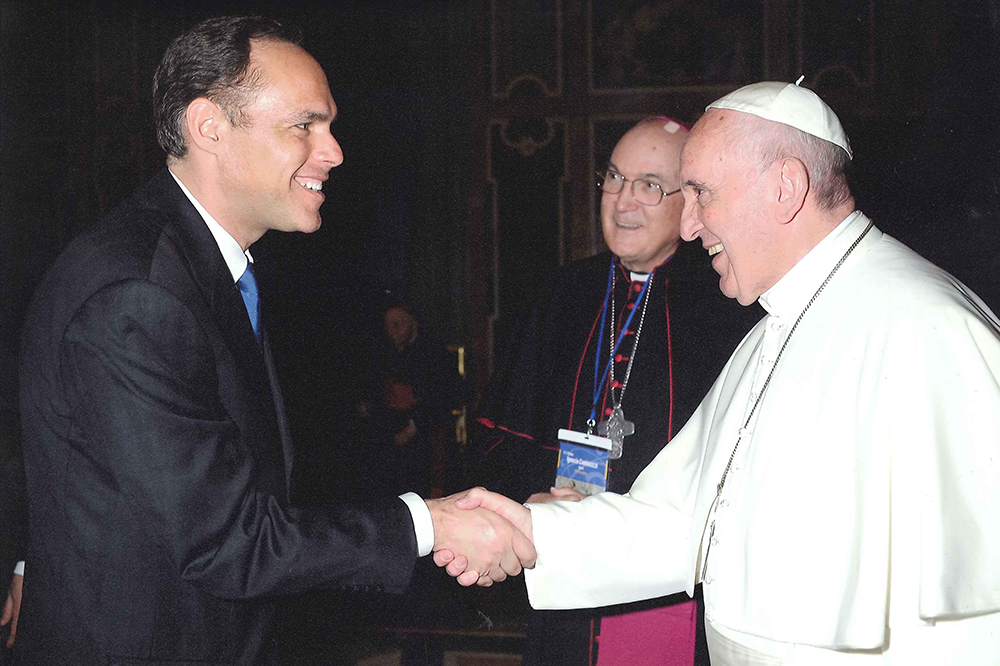In 2015, the Vatican appointed two Loyola Marymount University professors to the Pontifical Academy for Life. Founded in 1994 by Pope John Paul II, the Academy is dedicated to “the promotion and defense of human life, especially regarding bioethics as it regards Christian morality.” Its members consist of experts from a variety of disciplines who deliberate upon and advise the Church on matters of law, moral theology, and bioethics. Dr. Roberto Dell’Oro, Director of the Bioethics Institute, and Dr. Christopher Kaczor, Professor of Philosophy, have now joined its ranks. We asked Professor Kaczor to reflect upon his appointment and to share with us what this event means to him, below. To read Dr. Dell’Oro’s reflections, click here.
Meeting Pope Francis
Dr. Christopher Kaczor, Professor of Philosophy
As a child of 9 years of age, I had come close to meeting Pope St. John Paul II. I was in Rome with my parents on a sunny day in the Piazza Square in front of St. Peter’s Basilica. Since this was before the 1981 assassination attempt, the pope came round shaking hands with pilgrims.
As he neared us, my mother got to reach out to him. I was next in line. But a gaggle of nuns, as if at a rock concert, displaced me in greeting the Vicar of Christ. Shoot.
Well, almost 40 years later, I had another chance. An email from the Vatican brought happy news that I had been appointed to the Pontifical Academy for Life, an honorary society devoted to the study of “the principal problems of biomedicine and of law.” The message included happier news still that the members of the academy were granted an audience with Pope Francis.
Well, that’s the kind of email that gets an immediate and enthusiastic reply. Papal audiences can mean a ticket to join 6,300 people in the Paul VI Audience Hall and may also mean actually getting to meet the pope personally.
So, I asked Father Scott Berman, a terrific American priest who helps coordinate the activities of the academy, what sort of audience this would be. I learned that usually the five leaders of the academy and the conference speakers get to shake the pope’s hand, but sometimes the invitation to meet the pope is also extended to others depending on the circumstances. I certainly wasn’t a leader of the academy, nor was I speaker, but I was hopeful.
I was especially excited to meet Pope Francis. His message of reaching out to the vulnerable, his highlighting of the duty of Christian service to the needy, challenges me to grow in faith and in charity. Pope Francis’s distinctive way of understanding the message of Jesus, while utterly traditional, is also utterly difficult to carry out on a daily basis.
As he put it, “One goal for each day: to convey the tenderness of Christ to those who are most in need.” To reflect the mercy of God in one’s attitudes and choices is a challenge, but a challenge that is an essential part of trying to imitate the example of Jesus.
“The ultimate test of your greatness is the way you treat every human being,” said the pope on his recent visit to the U.S., “but especially the weakest and most defenseless ones.”
After a long flight from Los Angeles to Rome, I had a chance to meet the other members of the academy. The new members hailed from Italy, Japan, USA, France, Mexico, Peru, England, France and Mexico, and I met other members from India, Egypt and the Congo.
After being introduced to the rest of the academy, we settled into the meeting hall within Vatican City for our conference. United Nations style simultaneous translations of the talks into English, Italian, Spanish and German were available via headsets at each seat.
After our morning sessions, we made our way across Vatican City and entered into Clementine Hall, where popes lie in state after their deaths. Clementine Hall is decorated with exquisite Renaissance frescos, including St. Clement martyred by being thrown overboard into the sea.
Without announcement, Pope Francis walked in, took his seat and delivered an address to us about the importance of bearing personal witness in what we say and especially do to the dignity of all human beings. After his address, we were all invited forward to personally meet the Holy Father.
I had thought quite a bit about what to say to the pope. Unfortunately, I don’t know Italian or Spanish, the two best languages of Pope Francis. I was told he doesn’t know English well.
So, since Pope Francis and I had both spent two years living in Germany, I thought German might be my best bet. I wanted to say something meaningful, something that might prompt a little conversation. So, I planned on saying, “Holy Father, would you please pray for my family and my university?” in German. As we waited in the greeting line, I got ready to deliver my message.
When the big moment came, I shook Pope Francis’ hand and said, “Nice to meet you,” in English.
Well, I guess I’m not good under pressure.
With a big smile, the pontiff replied, “Pray for me. And may God bless you.”
God already had.
This article previously appeared in The Tidings (March 31, 2016).
